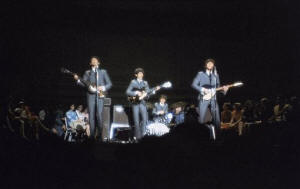|
 Sid Bernstein, who brought Beatles to Shea, dies Sid Bernstein, who brought Beatles to Shea, dies
 Send a link to a friend
Send a link to a friend
[August 22, 2013]
NEW YORK (AP) -- Misty-eyed music promoter Sid Bernstein, who booked such top acts as Jimi Hendrix, Judy Garland and the Rolling Stones and hit the highest heights when he masterminded the Beatles' historic concerts at Shea Stadium and Carnegie Hall, died Wednesday at age 95.
|
|
 Bernstein's daughter, Casey Deutsch, said he died in his sleep at a hospital. She cited no illness and said he died of natural causes. Bernstein's daughter, Casey Deutsch, said he died in his sleep at a hospital. She cited no illness and said he died of natural causes. For decades, the squat, floppy-haired Bernstein excelled like few others at being everywhere and knowing everybody. He worked with Garland, Duke Ellington and Ray Charles, promoted Dion, Bobby Darin and Chubby Checker and managed Esy Morales, the Rascals and Ornette Coleman. He was an early backer of ABBA, setting up the Swedish group's first American appearances. He was behind one of the first rock benefit shows, the 1970 "Winter Festival for Peace" at Madison Square Garden, which featured Hendrix and Peter, Paul and Mary. And he helped revive Tony Bennett's career with a 1962 show at Carnegie Hall.
A master of schmooze and schmaltz in an industry that never quits, Bernstein also had a studious side that led to his biggest break. He took a course on Western civilization at the New School for Social Research that required students to read a British newspaper once a week. It was 1963, and the Beatles were just catching on in their native country.

"This was the right time to be reading an English newspaper," he explained in a 2001 interview with the music publication NY Rock Confidential. "So here I am reading little stories about this group from Liverpool that is causing a lot of
'hysteria.' By the end of the course, I was so Beatle-ized by what I read, even though I did not hear a note, I said,
'gotta get 'em.'"
As Bernstein recalled, he couldn't get his agency interested in the group, so he handled the job himself. He tracked down Beatles manager Brian Epstein and convinced him that he could line up a gig at Carnegie Hall. The Beatles were still unknown in the U.S., and the price was cheap
-- $6,500 for two shows, a fraction of what Garland might have commanded. The promoter used his own money to pay Epstein, while officials at the classy Carnegie, where no rock stars had been permitted, apparently thought they had taken on a folk quartet. (The story has varied over the years.) The timing was perfect. By February 1964, Beatlemania had crossed over to the States, and the band was set to play on "The Ed Sullivan Show" just three days before the Carnegie concerts, guaranteeing maximum attention at minimum cost.
Once the Beatles hit, Bernstein was primed to get the bands that followed. He arranged shows for the Stones, the Animals and other British groups, while saving his biggest dreams for the Beatles. Everything for Bernstein was the latest and the greatest, but his word was never more golden than in 1965, when he landed the group at Shea Stadium, the idea given to him by a ticket manager at Carnegie Hall.

|
